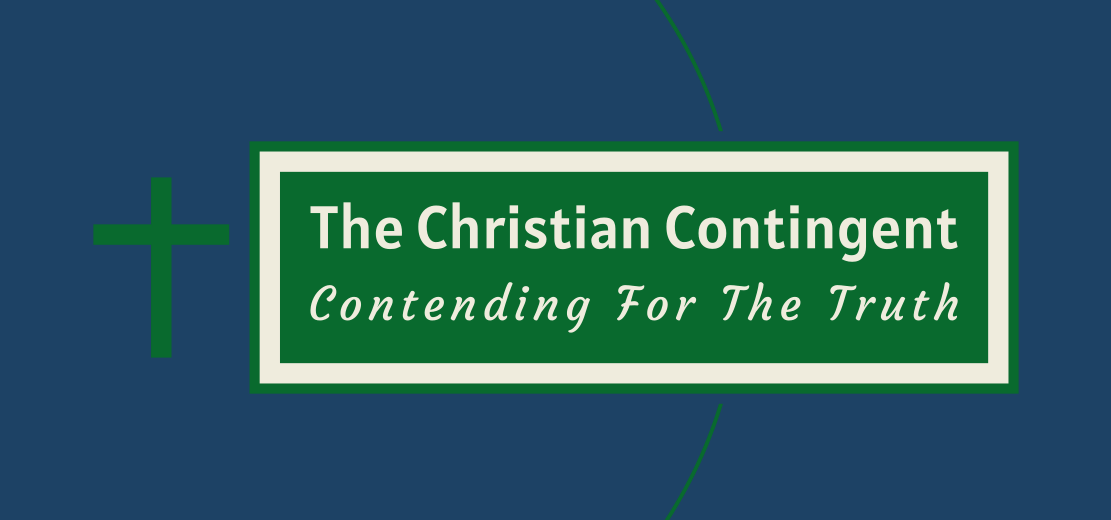This ministry is dedicated to providing The Truth.
Accentuating the importance of learning who The TRUTH is and what was written by God in the Bible. Jesus is The TRUTH. Every book of the Bible leads us to Jesus. The Gospel (the good news that we do not have to die for our sins) is given to us in the New Testament plainly or revealed. In the Old Testament it is said to be concealed, but it is there to be found (hindsight helps).

Christ is King

We are a small staff ministry with a very important mission, to share the Gospel with everyone.
Our mission is to help people become a Christ Follower and then know how to live as one. This world is a very unstable place and this ministry is dedicated to pointing people to The TRUTH. If we can show people how to live out a Godly walk in their everyday life, then they will be able to walk in the Spirit and not just live in the Spirit. Galatians 5:25
Our philosophy is that when we are talking about what the Bible says, we need to keep referencing the Bible itself, not what any one person thinks about it. 2 Timothy 3:16-17
Our vision is a group of people united by love for God and a further love for the Gospel. This group of people needs to live in the world, but it additionally needs to be unlike the world. The Christian Contingent needs to: be in Christ, walk in the Spirit, and love Jesus by obeying His commandments. John 14:20; Galatians 5:25; John14:15
What We Believe
Click on sections with arrows to read the full information.
God
Statement on Theology
We believe that God is a triune God (Ephesians 4:4-6) that has attributes that are communicable and incommunicable who created all that was created and His presence is immanent within creation having providence over it but is transcendent beyond it.
The Triune nature of God:
God is triune (Matthew 28:19). Three distinct persons, God the Father, God the Son, and God the Holy Spirit are all of one essence, all of one authority, and are all one God (Isaiah 48:16). Each person of the Trinity takes on a different role than the others (Hebrews 9:14), the Father calls us and is the sustainer; the Son saves us and died on our behalf to make us righteous before the Father; the Holy Spirit is within us working to make us more like Jesus so that we can be useful and righteous in God’s sight (1 John 5:7; John 14:26).
Attributes of God:
God has certain attributes that describe for us who God is (Romans 1:20). These attributes pertain to all of the three persons who are God (Numbers 23:19). These attributes cannot change and are an inseparable, permanent characteristic. They are a part of God’s essence, His very being (Isaiah 57:15). Some of these are incommunicable (1 Timothy 1:17) and some are communicable. Incommunicable attributes are those that human beings do not and cannot possess (John 4:24; 1 John 1:5). Communicable attributes are those that humans can and do possess in an imperfect way (1 John 4:8).
God’s Immanence in and Transcendence of creation:
God is both immanent and transcendent in His creation (Romans 1:20). These are a pair of concepts that no human can possess. These are not attributes of God, they describe His presence in creation (Jeremiah 23:24). God is immanent in all of creation (Daniel 2:21). He is the binding, motivating, ordering force in creation (Acts 17:27-28; Hebrews 1:3). All that is, exists because He is sustaining it (Revelation 4:11). God is transcendent from creation where nothing that happens in creation affects Him in a material way. What happens here can affect His feelings but only because He cares for His creation (John 3:16). God is not bound by any law or force that exists in the natural realm; His only restrictions are His own nature (Job 26:7; Psalm 115:3).
God’s Creation and Providence:
God did create all that has been created (Psalm 95:3-5; Jeremiah 51:15) and has providence over all of His creation (Revelation 4:11). No thing can be created from nothing, except by God (Colossians 1:16). This fact exemplifies the reality that anything that comes about in our existence had already been created by God. There is only change, not creation. God shepherds all of creation to the ends that He wishes (Ephesians 1:11; Isaiah 45:7). This is accomplished many different ways but all of creation obeys His will (James 1:18). Whether we call them “Natural laws” or miracles, (Hebrews 2:4) God made them possible and makes them exist as He wishes (Psalm 124:1-3).
Attributes of God
The God we believe in, is infinite. His infiniteness, which falls under Greatness[1] and is one of the incommunicable attributes of God, has many different aspects.
The attributes of God are concepts that describe who God is and not what God does.[2] These attributes cannot describe God in totality.[3] The attribute of infinity cannot be true of all humans, or any human. Which puts it into the incommunicable classification. God is Spirit, and we are not, we are in one place, in one time.[4]
The infinity of God is often expressed by the words Omnipresent, Omniscient, and Omnipotence. The word omnipresent is used to speak of God being “present everywhere in creation at the same time.”[5] Another way of looking at it is that “God is not subject to limitations of space.”[6] The infinity of God is not the same as omnipresent. Omnipresent focuses on the immanence of God and the infinity of God emphasizes the transcendence of God.[7] These aspects of the terms are limiting when not taken together for a full picture of the true attribute God possesses. He can be found anywhere so one thinks of omnipresent but He is not in one place and cannot be limited by space which would be infinite.
Another aspect of the infinite concept is the time aspect. He existed before time was and will be after time ceases. He also is not bound by any understanding of time. His existence transcends time and yet is immanent in time. He is found everywhere; in the same way He is found everywhen.[8] The concept of everlasting has the connotation that there is a timeline for Him. The concept of eternal holds the concept that God is outside of time. Both of these concepts fall short in their own ways, as God is outside of time but not so disconnected from it that He is not aware of time, though not inside time to be affected by it.[9]
One important aspect of Infiniteness is omniscience. His knowledge is complete. “And there is no creature hidden from His sight, but all things are naked and open to the eyes of Him to whom we must give account (Hebrews 4:13 NKJ).” He knows everything that has been, is now, can be and will be, all of the truths to be found in this world.[10] God cannot learn anything because He “already knows and has always known everything.”[11]
These aspects of infinity are closely related to the concept of Constancy. If God could change, ie. move to a different location, then He would not be omnipresent. If God could change and learn something, then He would not be omniscient. Put in theological terms, there is no quantitative, or qualitative change in God.[12]
Omnipotence is the concept that God is all powerful. He created the atoms that the world is made of and He can uncreate them as well. “… and He vanished from their sight (Luke 24:31).” He can make, remake, anything that He wants to, therefore He is all powerful. The only thing that He cannot do is act contrary to His nature.[13]
Erickson does a good job of laying out some different aspects of Infinity. Ryrie is quite brief on the subject.[14] Hodge does a good job of tying the different aspects of immutability, and eternity together with infinitude.[15] Allison is brief due to the nature of the book. Strong uses the classifications of Absolute or Immanent and Relative or Transitive.[16] Grudem uses the attributes as a study of God’s character.[17] Boice puts many attributes such as infinite, immutable, omniscience, and omnipresent under the heading of Eternal using different labels.[18]
The attribute of infinity is crucial when considering the eternity that is proclaimed in the Bible “For the wages of sin is death, but the gift of God is eternal life in Christ Jesus our Lord. (Romans 6:23 NKJ) We also need to keep in mind the infinity of the knowledge, presence, and power of God. He is present with us , knows what we are doing and thinking at any time, and He can and will do as He pleases in this world.
[1] Millard J. Erickson, Christian Theology, 3rd ed. (Grand Rapids, MI: Baker Academic, 2013), 238.
[2] Millard J. Erickson, Christian Theology, 3rd ed. (Grand Rapids, MI: Baker Academic, 2013), 236.
[3] Charles Caldwell Ryrie, Basic Theology: A Popular Systematic Guide to Understanding Biblical Truth (Chicago, IL: Moody Press, 1999), 39.
[4] Gregg R. Allison, 50 Core Truths Of The Christian Faith: A Guide to Understanding and Teaching Theology (Grand Rapids, MI: Baker Books, 2018), 75.
[5] Stanley Grenz, David Guretzki, and Cherith Fee Nordling, Pocket Dictionary of Theological Terms (Downers Grove, IL: InterVarsity Press, 1999), 86.
[6] Millard J. Erickson, Christian Theology, 3rd ed. (Grand Rapids, MI: Baker Academic, 2013), 243.
[7] Charles Caldwell Ryrie, Basic Theology: A Popular Systematic Guide to Understanding Biblical Truth (Chicago, IL: Moody Press, 1999), 44.
[8] Millard J. Erickson, Christian Theology, 3rd ed. (Grand Rapids, MI: Baker Academic, 2013), 287.
[9] Millard J. Erickson, Christian Theology, 3rd ed. (Grand Rapids, MI: Baker Academic, 2013), 287.
[10] Millard J. Erickson, Christian Theology, 3rd ed. (Grand Rapids, MI: Baker Academic, 2013), 245–246.
[11] James Montgomery Boice, Foundations of the Christian Faith: A Comprehensive & Readable Theology (Downers Grove, IL: InterVarsity Press, 1986), 134.
[12] Millard J. Erickson, Christian Theology, 3rd ed. (Grand Rapids, MI: Baker Academic, 2013), 249.
[13] Millard J. Erickson, Christian Theology, 3rd ed. (Grand Rapids, MI: Baker Academic, 2013), 248.
[14] Charles Caldwell Ryrie, Basic Theology: A Popular Systematic Guide to Understanding Biblical Truth (Chicago, IL: Moody Press, 1999), 43.
[15] Charles Hodge, Systematic Theology, vol. 1 (Oak Harbor, WA: Logos Research Systems, Inc., 1997), 390.
[16] Augustus Hopkins Strong, Systematic Theology (Philadelphia: American Baptist Publication Society, 1907), 247.
[17] Wayne A. Grudem, Systematic Theology: An Introduction to Biblical Doctrine (Leicester, England; Grand Rapids, MI: Inter-Varsity Press; Zondervan Pub. House, 2004), 156.
[18] James Montgomery Boice, Foundations of the Christian Faith: A Comprehensive & Readable Theology (Downers Grove, IL: InterVarsity Press, 1986), 106.
Bibliography
Allison, Gregg R. 50 Core Truths of the Christian Faith: A Guide to Understanding and Teaching Theology. Grand Rapids, MI: Baker Books, 2018.
Boice, James Montgomery. Foundations of the Christian Faith: A Comprehensive & Readable Theology. Downers Grove, IL: InterVarsity Press, 1986.
Grenz, Stanley, David Guretzki, and Cherith Fee Nordling. Pocket Dictionary of Theological Terms. Downers Grove, IL: InterVarsity Press, 1999.
Erickson, Millard J. Christian Theology. 3rd ed. Grand Rapids, MI: Baker Academic, 2013.
Grudem, Wayne A. Systematic Theology: An Introduction to Biblical Doctrine. Leicester, England; Grand Rapids, MI: Inter-Varsity Press; Zondervan Pub. House, 2004.
Hodge, Charles. Systematic Theology. Vol. 1. Oak Harbor, WA: Logos Research Systems, Inc., 1997.
Ryrie, Charles Caldwell. Basic Theology: A Popular Systematic Guide to Understanding Biblical Truth. Chicago, IL: Moody Press, 1999.
Strong, Augustus Hopkins. Systematic Theology. Philadelphia: American Baptist Publication Society, 1907.
Statement on Bibliology
We believe that the Bible in its Protestant Canon form is the clear, complete, unique, inerrant, and inspired revelation of the word of God that was given to us by the God of Abraham, Isaac, and Jacob (Psalm 119:105; 2 Timothy 3:17).
The Cannon of Scripture
The sixty-six books of the Protestant Canon are the only books that we believe are Scripture (Matthew 24:35). By Scripture we mean the Word of God or the writings that were inspired by the Holy Spirit and collected into the Protestant Bible. Thirty-nine books in the Old Testament which correspond to the Tanakh, (Luke 24:27,44) and twenty-seven in the New Testament (2 Peter 3:16).
Inspiration
Scripture was written through the inspiration of the Holy Spirit working in the hearts and minds of men. Through this inspiration (Job 32:8), Scripture becomes the revealed Word of God (Job 17:17). This inspirational work of the Holy Spirit starts in the hearts of the writers and follows to the very words that they penned (Galatians 3:16), without quenching the personality of the writer (Luke 12:12). There is no part of the Bible that was not inspired by the Holy Spirit (2 Timothy 3:16).
Inerrancy
Though these Scriptures were penned by men, they are the inerrant revealing of God’s word (2 Timothy3:16). These Scriptures are free from all falsehood, fraud and deceit in their entirety (John 17:17). Through the inspired nature of these Scriptures (1 Corinthians 14:37), they are infallible and are true and reliable in all the matters they address (Psalm 12:6; Proverbs 30:5).
Characteristics of Scripture
The God of Abraham, Isaac, and Jacob gave us these sixty-six books (Matthew 5:18). They are the whole of the word of God that God has chosen to reveal to us, and are all that is necessary for understanding and knowing God (2 Timothy 3:17). It is all that God wants us to know about Him through His word, and combined with general revelation, it is all that we need to know about Him (2 Timothy 3:15). They reveal all that He wishes to reveal to us finite humans. God is not limited by human language but we are, our language is sufficient for God to convey Himself through our words (1 Thessalonians 2:13). These Scriptures are clear and can be understood by anyone who wishes to seek God and understand Him.
General and Special Revelation
The general revelation that God provides to everyone, everywhere, throughout time is not sufficient to know God fully (Psalm 119:89). It allows us to know and understand the God of the special revelation. Special revelation needs general revelation, just as much as general revelation needs special revelation (Matthew 22:29). The special revelation builds on the knowledge gained from general revelation (Hebrews 1:1). The special revelation has been given to us so that we can know God and His will for us, as fully as we are able (Revelation 1:1; John 17:3).
Statement on Christology
We believe that Jesus The Christ is the only begotten Son of God who became incarnate through the virgin conception of a woman, He was crucified, rose again, ascended back to heaven and will return once more.
The Deity of Christ
The fact of the deity of Christ may be argued over but the facts are the facts, Jesus is fully man and fully God (Matthew 1:20, 16:16-19; 1 Timothy 3:16; Colossians 1:19). If He was anything less than God in human flesh, then the rest of what the Bible says about Him and salvation are null and void (1 Corinthians 15:14). If Jesus of Nazareth was not God incarnate, then He could not have born all of our sins when He died on the cross (Colossians 1:20; 1 Peter 2:24). How could all of our sins transfer to a mere man who was crucified, even if that man was sinless?
The Humanity of Christ
Jesus the Christ came to earth through a virgin conception enacted by the Holy Spirit (Luke 1:26-38). The whole of the Bible relies on this fact. How could a man not be of sin if He were born from a human mother and father? Sin is passed on to all men through Adam and all are born with that sin. For Jesus to not have that sin passed on to Him, He had to be the son of God (Romans 5:12). Jesus also needed to be fully human to save us from our sin through His death on the cross (Hebrews 2:13, 10:14). If He was not then He would not be like us and we would not benefit from His death (Hebrews 9:14).
The Hypostatic Union
The Hypostatic Union speaks of the union of God and human in the man Christ Jesus (Colossians 2:9). The Son who is the only begotten of the Father came to earth and was born as a man, lived a sinless life and was crucified for our sins (Philippians 2:5-11). This man Jesus Christ was both fully God and fully human. There were no two separate beings present in Jesus. There were no separate consciences. Jesus had one consciousness that allowed for His deity and His humanness.
The Virgin Birth
The human mother of Jesus was Mary. Jesus had no earthly biological father (Luke 1:27). The birth of Jesus was prophesied in Isaiah 7:14 stating that the sign will be the virgin giving birth to a Son whose name shall be Immanuel (Matthew 1:23). God the Holy Spirit came upon her and the power of the Most High over shadowed her and the child that was born was called holy – the Son of God (Luke 1:35). There was nothing unnatural about Mary, she just found favor with God. She was just as human as the rest of us (Matthew 1:25). She had two human parents that were of the sin nature just like you and I. When she was living a life that was as dedicated to God as she could be, she found favor with God to the point of receiving the blessing of being the mother of the Lord Jesus Christ (Luke 1:26-38).
Statement on Pneumatology
We believe that the Holy Spirit, one of the three persons of God, is God with the essence and all of the authority and power of God, and is present as a person on earth working in and through us.
The Deity of the Holy Spirit
God the Holy Spirit is as much God, as God the Father and God the Son are (John 15:26). He has feelings and personality with the same essence and authority as the other persons of the Godhead. The title Spirit of God shows the relationship of the Holy Spirit with the Father and the Son (2 Corinthians 3:17-18). If 1 Corinthians shows that a man and his spirit are one then the Holy Spirit and God are one. Spirit of God and the Spirit of Christ are terms that refer to the Holy Spirit (Romans 8:9, 13-14; Acts 16:6-7). He is omniscient (1 Corinthians 2:10-12), omnipotent (Genesis 1:1; Job 33:4), and omnipresent (Psalm 139:7-10; John 14:17) among many other attributes (Love (Galatians 5:22), Eternity (Hebrews 9:14), Holiness (Matthew 12:31-32), Truth (John 14:17, 15:26)). He is restraining sin in the world (2 Thessalonians 2:7).
The Personhood of the Holy Spirit
God the Holy Spirit has the power and authority of God as the Father and Son do, and He is a separate personality, a separate personhood, a separate being that is part of the Trinity. He is referred to with male pronouns by the New Testament writers indicating that the Spirit should be referred to as “He” (John 16:13-14). He has an intellect (1 Corinthians 2:10), knowledge (1 Corinthians 2:11), a mind (Romans 8:27), emotions (Ephesians 4:30), and will (Acts 16:6). As a result of His ability to feel, He can be grieved (Ephesians 4:30). He generated Jesus by overshadowing Mary (Matthew 1:20). God the Father is not God the Son is not God the Holy Spirit, yet the three are one. They are one essence and three separate persons. He can be resisted (Acts 7:51), lied to (Acts 5:3), obeyed (Acts 10:19-21), and blasphemed (Matthew 12:32).
The Work of the Holy Spirit
The Holy Spirit is here in the world today, in every believer (2 Corinthians 3:18). He is at work doing the will of the Son who directs Him as to what to say and what to do (John 16:14-15). We are regenerated by the Holy Spirit (Titus 3:5). He intercedes for us (Romans 8:26). He Sanctifies us (2 Thessalonians 2:13). He is a helper of the saints (John 14:16). He dwells within us and will abide with us always (John 16:16-17). The Holy Spirit teaches (John 14:26), testifies (John 15:26), guides (John 16:13), empowers (Zecheriah 4:6), transforms (2 Corinthians 3:18), convicts (John 16:8) and gives us liberty (2 Corinthians 3:17).
General and Special Revelation
There is a book that we call the Bible. In it is described a God who is the God of the universe which includes all of creation. God reveals Himself through two types of revelation called “Special Revelation” and “General Revelation”.
General revelation is derived from different areas, traditionally these are Nature, History, and the Constitution of the human being.[1] General revelation is called general as it is available to all people throughout all of the generations and it never ceases to be. It goes on “day unto day” … “night unto night” (Psalm 19:2, NKJ) throughout history. There is not a group of people who have not observed general revelation.[2] This type of revelation does not have a voice, but has to be observed.[3] General revelation is known through reason, human reason, and because of this handicap, general revelation will never reveal all that we need to know about the One True God. Nature is one area where people can observe the handiwork of the designer/creator. Through the study of the stars and everything in our sky, we can know that there is an order and harmony there.[4] Throughout all of nature there can be no doubt that there is a designer and creator that coordinated all of the physical universe.
History is another area for general revelation. When history is examined especially with benefit of special revelation, the hand of an all powerful being is seen. The protecting of certain people groups and the downfall of others called providential control, can be seen through a study of history.[5] Studying history is not as easy or definite as the study of nature for the simple fact that history can only be studied second hand. The past is not accessible to us, and we must rely on writings from those who were witnesses. These witnesses may not have written down the information (or it was lost) that we are looking for.[6]
The highest of earthly beings is the human who, in being who they are, tell of a higher power controlling or at least imprinting directions within us.[7] Our physical being is evidence for a higher power, or intelligent design.[8] Then there is the discussion of our conscience. The moral basis that exists within all of us was put there by the higher power. “It is, however, in the moral and spiritual qualities of humankind that God’s character is best perceived.”[9] Romans 2:11-16 is where Paul talks about the law of God within the hearts of all people, even the people who do not have the law that is revealed by special revelation. All people, throughout history, and in all cultures have believed in a “higher reality than themselves.”[10] Through this, they have created a belief system around this knowledge of a higher reality.[11] Many have taken this propensity to worship something that is not Jehovah, and ended up worshiping idols which represent demons.
Special or particular revelation, is the God of the universe revealing Himself to individuals at certain places at certain times, some of these revealing’s were recorded in the written Scriptures.[12] Special revelation is given to us for the purposes of relationship. If we did not have these revelations, we would not have a close relationship with God. These Scriptures were added to by the man Jesus Christ. Jesus Christ was begotten of the Holy Spirit and is the living incarnate Word. The Scriptures are husbanded by the Holy Spirit and known as the inerrant, living, written Word of God.[13] Revelations of God to man were happening before the fall of Adam and Eve, as evidenced by the instructions for naming the animals, not eating of the tree of the knowledge of good and evil, etc. After the fall the need for specific revelations were increased because of the sinfulness of man separating him from the face of God. These revelations are the only way for us to know God and what He wants for us. Our relationship with God has been severed and therefore we need specific revelation due to general revelations inability to show us how to know God and have a relationship with Him.[14] God has to show us how we can be redeemed from our sin, forgiven from our sins, and saved into eternity.[15] “All Scripture is given by inspiration of God, and is profitable for doctrine, for reproof, for correction, for instruction in righteousness, that the man of God may be complete, thoroughly equipped for every good work” (2 Timothy 3:16-17).
Erickson talks about the styles of special revelation, where most of the systematic theologies only talk about the modes of special revelation. He also discusses the aspects of Scripture being propositional.
Special revelation needs general revelation, just as much as general revelation needs special revelation. The general revelation allows us to know and understand the God of the special revelation. The special revelation builds on the knowledge gained from general revelation.[16]
[1] Millard J. Erickson, Christian Theology, 3rd ed. (Grand Rapids, MI: Baker Academic, 2013), 123.
[2] Charles Caldwell Ryrie, Basic Theology: A Popular Systematic Guide to Understanding Biblical Truth (Chicago, IL: Moody Press, 1999), 31.
[3] Paul I. Enns, The Moody Handbook of Theology, Rev. ed. (Chicago, IL: Moody Publishers, 2014), 160.
[4] Paul I. Enns, The Moody Handbook of Theology, Rev. ed. (Chicago, IL: Moody Publishers, 2014), 160.
[5] Paul I. Enns, The Moody Handbook of Theology, Rev. ed. (Chicago, IL: Moody Publishers, 2014), 162.
[6] Millard J. Erickson, Christian Theology, 3rd ed. (Grand Rapids, MI: Baker Academic, 2013), 123.
[7] Millard J. Erickson, Christian Theology, 3rd ed. (Grand Rapids, MI: Baker Academic, 2013), 124.
[8] Paul I. Enns, The Moody Handbook of Theology, Rev. ed. (Chicago, IL: Moody Publishers, 2014), 160.
[9] Millard J. Erickson, Christian Theology, 3rd ed. (Grand Rapids, MI: Baker Academic, 2013), 124.
[10] Millard J. Erickson, Christian Theology, 3rd ed. (Grand Rapids, MI: Baker Academic, 2013), 124.
[11] Millard J. Erickson, Christian Theology, 3rd ed. (Grand Rapids, MI: Baker Academic, 2013), 124.
[12] Wayne A. Grudem, Systematic Theology: An Introduction to Biblical Doctrine (Leicester, England; Grand Rapids, MI: Inter-Varsity Press; Zondervan Pub. House, 2004), 48.
[13] Paul I. Enns, The Moody Handbook of Theology, Rev. ed. (Chicago, IL: Moody Publishers, 2014), 163.
[14] Millard J. Erickson, Christian Theology, 3rd ed. (Grand Rapids, MI: Baker Academic, 2013), 145; Augustus Hopkins Strong, Systematic Theology (Philadelphia: American Baptist Publication Society, 1907), 111.
[15] Augustus Hopkins Strong, Systematic Theology (Philadelphia: American Baptist Publication Society, 1907), 114.
[16] Millard J. Erickson, Christian Theology, 3rd ed. (Grand Rapids, MI: Baker Academic, 2013), 146.
Bibliography
Erickson, Millard J. Christian Theology. 3rd ed. Grand Rapids, MI: Baker Academic, 2013.
Enns, Paul I. The Moody Handbook of Theology. Rev. ed. Chicago, IL: Moody Publishers, 2014
Grudem, Wayne A. Systematic Theology: An Introduction to Biblical Doctrine. Leicester, England; Grand Rapids, MI: Inter-Varsity Press; Zondervan Pub. House, 2004.
Ryrie, Charles Caldwell. Basic Theology: A Popular Systematic Guide to Understanding Biblical Truth. Chicago, IL: Moody Press, 1999.
Strong, Augustus Hopkins. Systematic Theology. Philadelphia: American Baptist Publication Society, 1907.
Church
Statement on Ecclesiology
We believe that the Church is the body of believers that belongs to the Lord, it is both universal, and local, with organization and leadership to carry out the ordinances of the Lord.
Nature and Purpose
The church is composed of believers who have been baptized and wish to join (Ephesians 1:22-34). It is for the edification and exhortation of believers to know and to do His will (Ephesians 4:12).
Universal Church
The church is universal throughout time and space. It is made up of all believers throughout time (Ephesians 2:20). There are only people in this Church as there are no male, female, race, nationality, slave or free (1 Corinthians 12:12-13).
Local Church
The local church is the church that we gather with on Sunday and/or during the week (Hebrews 10:25). It is the people that we gather together with to celebrate the glorious God and the gifts that He has given to us. It is where most people get the training and encouragement for being a Christian. The church needs to meet regularly for fellowship and worship of the Lord. Prayer for other members is necessary in a proper fellowship. Teaching of the word should be done regularly from the pulpit and by other teachers through weekly small group and one on one interactions (Ephesians 2:19-22). Confirmation of new believers is another function of the local church that helps the education of believers. Ordination of Pastors is another function of the local church. Marriage of the congregants needs to be done by someone authorized by the state which usually pastors are, but more importantly the marriage should be performed by someone trained and qualified to perform the ceremony before the Lord as this is a matter that the Lord takes seriously. The laying on of hands by the elders is most likely and usually coordinated through the church (James 5:14).
Church Leadership
The Church leadership position is held by Jesus and the Holy Spirit (John 16:13). The local church leadership is held by one pastor or more, and they are answerable to the Elder Board, who are in turn answerable to the congregation (1 Peter 5:2). Deacons and Deaconesses should carry out the necessary tasks that are required within a church (Philippians 1:1). There should be some form of leadership on a larger scale than that at just the single church level. This should provide the checks and balances to keep the church on the right path (2 Timothy 3:16).
Church Ordinances
The church should observe the commands of Jesus, baptizing believers and celebrating the Lord’s supper regularly (Acts 2:38; Matthew 28:19). These are the only two ordinances that are given by Christ Jesus our Lord. Baptism should be the immersion of the believer in water, after a profession of faith. The Lords supper should be taken regularly by all believers who are right with God. If they partake and do not have clear consciences, then they risk sickness and even death (1 Corinthians 11:28-29).
Statement on Anthropology
We believe that the origin of humanity was the creation by God of Adam and Eve, who were created male and female with three aspects to their being, to glorify, to worship, and to serve God. Adam and Eve fell into sin and passed the sinful state to all humanity.
The Origin of Humanity
Adam and Eve were created by God on the sixth day and they were part of a creation that was very good. We were created to have dominion over the earth (Genesis 1:26,28).
The Nature of Humanity
Mankind has three natures, the body of flesh and blood, the soul which is our emotions, will, and mind, and the spirit which as a believer is seated with Christ in the heavenlies (Ephesians 2:6). An unbeliever’s spirit is dead separated from God (Ephesians 2:1,5-6).
Humanity’s Relation to God
Humans were created in the image and likeness of God (Genesis 1:27) to glorify (Isaiah 43:7; 1 Corinthians 10:31), worship and serve Him (Luke 4:8). As Seth was said to be in the image and likeness of Adam (Genesis 5:3), every way that we are like God is His image.
The Origin and the Role of Human Gender
When God created man, it was not good that he was alone, so God took a rib from Adam and created Eve from that rib (Genesis 2:18-22). On the sixth day when God created man, He created them male and female. This distinction was for a blessing through procreation (Genesis 1:27-28; 2:24). When God created Eve, it was not to be a servant to Adam, but a helper and companion (Genesis 2:18).
The Fall of Humanity
In the Garden of Eden, Adam and Eve could eat from any tree that they chose, except one. When Eve was approached by Lucifer and was taunted into eating from the tree of the knowledge of good and evil, she gave the fruit to Adam and he ate of it which caused all of creation to be tainted by sin (Romans 5:12). Lucifer used the lust of the flesh, the lust of the eyes, and the pride of life to coerce Eve into eating from the forbidden tree (Genesis 3:1-21).
The Presence and the Consequences of Sin
Since Eve and Adam ate from the tree that was forbidden to them, sin has been a presence in this world (Romans 5:12). Before that there was no death, no separation from God (Genesis 2:25). After that we are described as having hearts that are “deceitful above all things, and desperately wicked (Jeremiah 17:9)” and in a state of total depravity. Our mind, will, emotions (soul), and flesh have been corrupted through the sin of Adam (Ephesians 2:2-3). Our spirit has died – separated from God – through the sin of Adam (Ephesians 4:18-19; John 3:36; Colossians 2:13), and is only brought back to life through belief in the life, death and resurrection of the Lord Jesus Christ (Romans 6:23; Colossians 2:14).
Statement on Soteriology
We believe that the atonement that Jesus provided was sufficient for all the worl; the salvation that is available through that atonement, if accepted, will provide us with justification, and ongoing sanctification, resulting in our glorification.
Atonement
Christ died for all people and the natural world (1 John 2:2). His death is valued as being able to save all humankind. This gift will only be utilized by those who will accept Jesus into their hearts. His death also gave the occasion to conquer evil so that all of creation will be redeemed from the curse of sin (John 3:17).
Order of Salvation
This order is somewhat of a fabricated order as some of it happens all at the same time. The only three that need to stay in order are Justification, Sanctification, and Glorification. Of course, to God they all are an accomplished fact (Isaiah 46:10).
Election: We were chosen by God before the creation (Ephesians 1:4). He chose those who would believe because He knew us, who we are, who we want to serve, not just what we would do or choose. The election does not mean that we do not have to choose for ourselves or preach to others, as we do not know who is elected and who is not.
Calling: We are called by the hearing of the Gospel; we may hear it many times before it becomes effectual (Ephesians 1:13).
Justification
Justification is the term for the point in time when we respond to the Gospel and convert from unbelief and death, to belief and rebirth to life through Christ. It is a legal and positional change that takes place (Romans 5:1, 8:16,17).
Effectual Calling: There is a calling by God that at some point becomes effectual (we respond) (2 Timothy 1:9).
Regeneration: Must happen to some degree for us (desperately wicked) to be able to choose to repent.
Conversion: This is the point where the partial regeneration turns into faith in God, the repentance of our sins, and acceptance of Christ into our lives (2 Corinthians 5:17). When we believe with our hearts and proclaim Him with our mouths, we are fully regenerated as born again and are adopted into God’s family as justified (Romans 10:9-10).
Sanctification
This is a process that happens from the time we are justified until we are glorified (2 Corinthians 3:18). It means that we must persevere through this life. We must remain faithful and true to God (Hebrews 12-14). God will always give us the ability to maintain our faith until we pass from this life (Matthew 6:33; 1 Thessalonians 5:23).
Glorification
The end of our life here on earth is when we will be glorified. We will be perfected, physically, mentally, and spiritually. We will be separated from sin, from its effects, influence, and presence. We will become like Christ and live with Him and the Father (John 17:22; Colossians 3:4).
Statement on Eschatology
We believe that Christ will rapture the believers to be with Him in heaven, return bodily to the earth, resurrect the righteous, reign for 1,000 years, then raise the wicked dead for the final judgement where the righteous will live in the new Jerusalem and the wicked will be cast into the lake of fire forever.
The Rapture
The rapture will happen first without prior notice or any warning. The dead in Christ will rise first and then together with those in Christ who are alive shall be caught up to meet Him in the air (1 Thessalonians 4:17).
Christ’s Return
At the end of the tribulation, Christ will return to the earth in bodily form in a way that all will know it is Him and that He has returned to reign (Revelation 19:11-16). Everyone will know that it is Jesus Christ because “the sign of the Son of Man will appear in heaven, and then all the tribes of the earth will mourn… (Matthew 24:30).” If Jesus will be seen by the whole world so that every tribe will know and mourn, then there could be no secret return.
The Resurrection and Eternal State of the Righteous Dead
When the believer dies their soul goes to God who judges them. If they are judged according to the righteousness of Christ (believer) then they are joined with their spirit which is already seated with Christ in the heavenlies (Ephesians 2:4-7). They will be forever with the Lord. At the return of Jesus to the earth, they will be reunited with their bodies (Revelation 20:4-6). At the end of the millennium after the great white throne judgement there will be a new heaven and earth where the new Jerusalem will be brought from heaven for the believers to inhabit forever (Revelation 21:1-2; John 14:2).
Christ’s Millenium Kingdom
When Christ returns, the beast along with his false prophet, will be thrown into the lake of fire, Jesus will defeat the forces that were with the beast, Satan will be bound and cast into a pit. Jesus will reign for a thousand years with His saints. Then Satan will be released for a little while to deceive the nations to make war on the saints and the city of Jerusalem. Fire will come from heaven and devour these people. Satan will be cast with them into the lake of fire and brimstone to be tormented day and night forever (Revelation 19:19-20:10).
The Resurrection and Eternal State of Unbelievers
When unbelievers die they are sent to Sheol and at the end of the millennial reign of Christ a great white throne and Him who sat on it – from whose face the earth and the heaven fled away – appears. Then all of the dead, from the sea, Death, and Hades, are resurrected and judged according to their works, then Death and Hades are going to be cast into the lake of fire. Then anyone not found written in the book of life was cast into the lake of fire (Revelation 20:11-15).
Perseverance of the Saints
When speaking of perseverance of the Saints, there are two general categories, according to the first category you cannot lose your salvation, in the second you can lose your salvation. These categories are represented by Calvinism and Arminianism, neither represent the best Biblical view which is that you will not lose your salvation but you can reject it.
Calvinism and Arminianism are two ways of understanding the predestination of the believer but also represent the two major categories of thought on the ability to lose one’s salvation. It may be helpful to outline a view of the process of salvation. Most scholars start with some sort of effectual calling, whether that is starting with conversion (Arminian), or regeneration (Calvinist),[1] which is the justification of the individual. Once a person is justified the process of sanctification starts to take place.[2] This process does not cease until we graduate to the heavenly realms. Then glorification takes place[3] as we are fully vindicated while our body will be fully transformed to a spiritual body and we will be saved from the presence of sin.[4]
During the process of sanctification there is obviously the presence of evil that we have to resist and turn away from (James 4:7). The ability to maintain the faith during this period is called Perseverance or Preservation or Eternal Security. Although these terms are similar Charles Ryrie prefers Eternal Security “the work of God that guarantees that the gift of salvation, once received, is forever and cannot be lost.”[5] to explain his position.
Perseverance “of the saints means that all those who are truly born again will be kept by God’s power and will persevere as Christians until the end of their lives, and that only those who persevere until the end have been truly born again.”[6] This is usually the term that is used for the fifth point in Calvinism. The true believer, though there may be times of backsliding, will be kept from totally and finally falling away from the faith and will be saved through perseverance unto eternity.[7] The major biblical support that Calvinists use is John 10:27-30 which speaks of the safety with which we reside in Jesus’s hand and His Father’s hand. Some of the drawbacks of this view are that it allows no personal freedom to choose. Once a believer is locked in, they cannot choose otherwise.[8] When someone appears to fall away the explanation would be that they were not truly saved even Judas was not truly saved as Jesus said “one of you is a devil (John 6:70).”
The Arminian view first espoused by James Arminius (1560-1609) was added to and forged into a system by Simon Episcopius (1583-1643).[9] This view is that you very much can lose your salvation. The main biblical support for this is Hebrews 6:4-6. In this passage the described people, who could only be believers, are not able to be brought back to repentance. This would constitute the ability to fall away and not have any chance of being saved. Some counter this by saying that the person must not have been truly saved, but the description could only be someone who is saved.[10] Another explanation is that the words “fall away” cannot refer to eternal life because of what John’s gospel says.[11]
When looking at the two views and the scriptures that they use for their main positions the text surrounding the Hebrews passage makes it plain that the people of verses 4-6 are not going to fall away. Verses 9-12 state that the writer is confident of better things of them. Implying that a believer could fall away but that God makes it sure that they will not.[12] This is the position that Erickson takes.
As a practical doctrine, the verses from the book of John are the best to refer to. They are the most upbeat and comforting as opposed to the verses from Hebrews. If someone came with the fear that they have lost their salvation, the question to ask would be, “How”? The only sin that cannot be forgiven is to blaspheme the Holy Spirit (Matthew 12:22-32; Mark 3:22-30) and that only happens if you deny that He exists and reject His salvation forever.
[1] Millard J. Erickson, Christian Theology, 3rd ed. (Grand Rapids, MI: Baker Academic, 2013), 863.
[2] James Montgomery Boice, Foundations of the Christian Faith: A Comprehensive & Readable Theology (Downers Grove, IL: InterVarsity Press, 1986), 402.
[4] Erickson, Christian Theology, 926.
[5] Charles Caldwell Ryrie, Basic Theology: A Popular Systematic Guide to Understanding Biblical Truth (Chicago, IL: Moody Press, 1999), 379.
[6] Wayne A. Grudem, Systematic Theology: An Introduction to Biblical Doctrine (Leicester, England; Grand Rapids, MI: Inter-Varsity Press; Zondervan Pub. House, 2004), 788.
[7] Ryrie, Basic Theology: A Popular Systematic Guide to Understanding Biblical Truth, 379.
[8] Erickson, Christian Theology, 919.
[9] Ryrie, Basic Theology: A Popular Systematic Guide to Understanding Biblical Truth, 381.
[10] Erickson, Christian Theology, 920.
[11] Zane C. Hodges, “Hebrews,” in The Bible Knowledge Commentary: An Exposition of the Scriptures, ed. J. F. Walvoord and R. B. Zuck, vol. 2 (Wheaton, IL: Victor Books, 1985), 795.
[12] Grudem, Systematic Theology: An Introduction to Biblical Doctrine, 788.
Bibliography
Boice, James Montgomery. Foundations of the Christian Faith: A Comprehensive & Readable Theology. Downers Grove, IL: InterVarsity Press, 1986.
Erickson, Millard J. Christian Theology. 3rd ed. Grand Rapids, MI: Baker Academic, 2013.
Grudem, Wayne A. Systematic Theology: An Introduction to Biblical Doctrine. Leicester, England; Grand Rapids, MI: Inter-Varsity Press; Zondervan Pub. House, 2004.
Hodges, Zane C. “Hebrews.” In The Bible Knowledge Commentary: An Exposition of the Scriptures, edited by J. F. Walvoord and R. B. Zuck, 2:794. Wheaton, IL: Victor Books, 1985.
Ryrie, Charles Caldwell. Basic Theology: A Popular Systematic Guide to Understanding Biblical Truth. Chicago, IL: Moody Press, 1999.
We affirm
The Chicago Statement on Biblical Innerency
The Short Statement
- God, who is Himself Truth and speaks truth only, has inspired Holy Scripture in order thereby to reveal Himself to lost mankind through Jesus Christ as Creator and Lord, Redeemer and Judge. Holy Scripture is God’s witness to Himself.
- Holy Scripture, being God’s own Word, written by men prepared and superintended by His Spirit, is of infallible divine authority in all matters upon which it touches: it is to be believed, as God’s instruction, in all that it affirms; obeyed, as God’s command, in all that it requires; embraced, as God’s pledge, in all that it promises.
- The Holy Spirit, Scripture’s divine Author, both authenticates it to us by His inward witness and opens our minds to understand its meaning.
- Being wholly and verbally God-given, Scripture is without error or fault in all its teaching, no less in what it states about God’s acts in creation, about the events of world history, and about its own literary origins under God, than in its witness to God’s saving grace in individual lives.
- The authority of Scripture is inescapably impaired if this total divine inerrancy is in any way limited or disregarded, or made relative to a view of truth contrary to the Bible’s own; and such lapses bring serious loss to both the individual and the Church.
The Chicago Statement on Biblical Inerrancy
Articles of Affirmation and Denial
ARTICLE I
- We affirm that the Holy Scriptures are to be received as the authoritative Word of God.
- We deny that the Scriptures receive their authority from the Church, tradition, or any other human source.
ARTICLE II
- We affirm that the Scriptures are the supreme written norm by which God binds the conscience, and that the authority of the Church is subordinate to that of Scripture.
- We deny that Church creeds, councils, or declarations have authority greater than or equal to the authority of the Bible.
ARTICLE III
- We affirm that the written Word in its entirety is revelation given by God.
- We deny that the Bible is merely a witness to revelation, or only becomes revelation in encounter, or depends on the responses of men for its validity.
ARTICLE IV
- We affirm that God who made mankind in His image has used language as a means of revelation.
- We deny that human language is so limited by our creatureliness that it is rendered inadequate as a vehicle for divine revelation. We further deny that the corruption of human culture and language through sin has thwarted God’s work of inspiration.
ARTICLE V
- We affirm that God’s revelation in the Holy Scriptures was progressive.
- We deny that later revelation, which may fulfill earlier revelation, ever corrects or contradicts it. We further deny that any normative revelation has been given since the completion of the New Testament writings.
ARTICLE VI
- We affirm that the whole of Scripture and all its parts, down to the very words of the original, were given by divine inspiration.
- We deny that the inspiration of Scripture can rightly be affirmed of the whole without the parts, or of some parts but not the whole.
ARTICLE VII
- We affirm that inspiration was the work in which God by His Spirit, through human writers, gave us His Word. The origin of Scripture is divine. The mode of divine inspiration remains largely a mystery to us.
- We deny that inspiration can be reduced to human insight, or to heightened states of consciousness of any kind.
ARTICLE VIII
- We affirm that God in His Work of inspiration utilized the distinctive personalities and literary styles of the writers whom He had chosen and prepared.
- We deny that God, in causing these writers to use the very words that He chose, overrode their personalities.
ARTICLE IX
- We affirm that inspiration, though not conferring omniscience, guaranteed true and trustworthy utterance on all matters of which the biblical authors were moved to speak and write.
- We deny that the finitude or fallenness of these writers, by necessity or otherwise, introduced distortion or falsehood into God’s Word.
ARTICLE X
- We affirm that inspiration, strictly speaking, applies only to the autographic text of Scripture, which in the providence of God can be ascertained from available manuscripts with great accuracy. We further affirm that copies and translations of Scripture are the Word of God to the extent that they faithfully represent the original.
- We deny that any essential element of the Christian faith is affected by the absence of the autographs. We further deny that this absence renders the assertion of biblical inerrancy invalid or Irrelevant.
ARTICLE XI
- We affirm that Scripture, having been given by divine inspiration, is infallible, so that, far from misleading us, it is true and reliable in all the matters it addresses.
- We deny that it is possible for the Bible to be at the same time infallible and errant in its assertions. Infallibility and inerrancy may be distinguished, but not separated.
ARTICLE XII
- We affirm that Scripture in its entirety is inerrant, being free from all falsehood, fraud, or deceit.
- We deny that biblical infallibility and inerrancy are limited to spiritual, religious, or redemptive themes, exclusive of assertions in the fields of history and science. We further deny that scientific hypotheses about earth history may properly be used to overturn the teaching of Scripture on creation and the flood.
ARTICLE XIII
- We affirm the propriety of using inerrancy as a theological term with reference to the complete truthfulness of Scripture.
- We deny that it is proper to evaluate Scripture according to standards of truth and error that are alien to its usage or purpose. We further deny that inerrancy is negated by biblical phenomena such as a lack of modern technical precision, irregularities of grammar or spelling, observational descriptions of nature, the reporting of falsehoods, the use of hyperbole and round numbers, the topical arrangement of material, variant selections of material in parallel accounts, or the use of free citations.
ARTICLE XIV
- We affirm the unity and internal consistency of Scripture.
- We deny that alleged errors and discrepancies that have not yet been resolved vitiate the truth claims of the Bible.
ARTICLE XV
- We affirm that the doctrine of inerrancy is grounded in the teaching of the Bible about inspiration.
- We deny that Jesus’ teaching about Scripture may be dismissed by appeals to accommodation or to any natural limitation of His humanity.
ARTICLE XVI
- We affirm that the doctrine of inerrancy has been integral to the Church’s faith throughout its history.
- We deny that inerrancy is a doctrine invented by Scholastic Protestantism, or is a reactionary position postulated in response to negative higher criticism.
ARTICLE XVII
- We affirm that the Holy Spirit bears witness to the Scriptures, assuring believers of the truthfulness of God’s written Word.
- We deny that this witness of the Holy Spirit operates in isolation from or against Scripture.
ARTICLE XVIII*
- We affirm that the text of Scripture is to be interpreted by grammatico-historical exegesis, taking account of its literary forms and devices, and that Scripture is to interpret Scripture.
- We deny the legitimacy of any treatment of the text or quest for sources lying behind it that leads to relativizing, dehistoricizing, or discounting its teaching, or rejecting its claims to authorship.
ARTICLE XIX
- We affirm that a confession of the full authority, infallibility, and inerrancy of Scripture is vital to a sound understanding of the whole of the Christian faith. We further affirm that such confession should lead to increasing conformity to the image of Christ.
- We deny that such confession is necessary for salvation. However, we further deny that inerrancy can be rejected without grave consequences, both to the individual and to the Church.
The Nicene Creed
We believe in one God,
the Father, the Almighty,
maker of heaven and earth,
of all that is seen and unseen.
We believe in one Lord, Jesus Christ,
the only Son of God,
eternally begotten of the Father,
God from God, Light from Light,
true God from true God,
begotten, not made,
consubstantial to the father.
Through him all things were made.
For us and for our salvation
he came down from heaven:
by the power of the Holy Spirit
he became incarnate from the Virgin Mary,
and was made man.
For our sake he was crucified under Pontius Pilate;
he suffered death and was buried.
On the third day he rose again
in accordance with the Scriptures;
he ascended into heaven
and is seated at the right hand of the Father.
He will come again in glory to judge the living and the dead,
and his kingdom will have no end.
We believe in the Holy Spirit, the Lord, the giver of life,
who proceeds from the Father and the Son.
With the Father and the Son he is worshiped and glorified.
He has spoken through the Prophets.
We believe in one holy catholic and apostolic Church.
We acknowledge one baptism for the forgiveness of sins.
We look for the resurrection of the dead,
and the life of the world to come. Amen.
What we reject
We reject
We reject: (1) The belief that true Christians can be demon possessed; (2) “5-point Calvinism” (i.e., a fatalistic Calvinistic view that leaves no room for free will; specifically, we reject the belief that Jesus’ atonement was limited, instead we believe that He died for the world and all people, and we reject the assertion that God’s wooing grace cannot be resisted or that He has elected some people to go to hell; instead we believe that anyone who wills to come to Christ may do so); (3) “positive confession” (the faith movement belief that God can be commanded to heal or work miracles according to man’s will), (4) human prophecy that supersedes the Scripture, (5) the incorporation of humanistic and secular psychology and philosophy into Biblical teaching, and (6) the over-emphasis of spiritual gifts, experiential signs and wonders to the exclusion of Biblical teaching.
Taken from Calvary Chapel Chester Springs “What We Believe” Accessed July 10, 2024, https://cc-chestersprings.com/about-calvary-chapel/whatwebelieve/


Helping to guide you through your life in this world
The only Book that we need to know and obey has within it the only instructions on how to live forever. (John 11:26)
Meet our team
This ministry wishes that the people behind the scenes are not glorified by putting our pictures or personal information on this page. We are human, we make errors, please search the Bible for yourselves. We wish for you to be pointed to the One who is our Teacher and our Salvation.

A Contender
Founder, CEO & Architect; MA, Moody Theological Seminary

Another Contender
Manager

Also a Contender
Discernment Specialist

Still A Contender
Helper and faithful believer
FAQs
We are working on building this ministry and furthermore, when it is large enough, in addition to this site we will have an app, we will be honored to have you be a part of that experience.
- Collaborate with fellow Contenders.
- Help us with our information.
- Experience the world of Biblical living.

